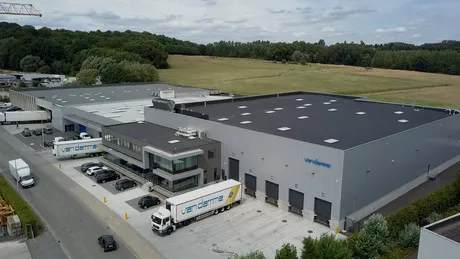Despite the restless banana market, caused by Panama Disease, unhappy growers and low prices from retailers, banana ripening plant Vandamme from Belgium is doing well. Due to an annual growth of 15 per cent on average, the ripening plant increased its capacity by building new ripening cells in the past two years, and the last of these cells will be taken into use in March. The older cells have also been renovated to be ready for the future. To this end, the company has switched to an environmentally friendlier system to ripen the bananas.

“We’re completely up to date thanks to our new ripening cells. The new cells are completely environmentally friendly and focused on the future. We also switched to from the Freon coolant to ammonia, and in the halls we’re aiming for just water at the right temperature, so that coolant doesn’t end up in the circuit of the ripening cells. Besides, due to recuperation of the heat from the ripening cells, we can heat our office, conference rooms and dressing rooms. One hundred per cent of the energy is re-used,” says Christophe Vandenbroeck of Vandamme. “The construction is partly the result of the ever-stricter norms and the lack of room and capacity. Our customers are growing as well, and we had to grow along with them in order to be able to continue serving them well.”

Independent
Vandamme is an independent ripener that is specialised in ripening bananas. “We currently prefer focusing solely on bananas. Ripening other fruit, such as mangoes or avocados, requires a different approach and specialisation. Besides, ripening other fruit also requires more room, and we’re currently completely occupied with bananas,” Christophe explains. In addition to ripening, Vandamme also offers services like packing and labelling the bananas. “The advantage of being independent is that the product we supply completely meets demands of the customers. The customer chooses origin and type of banana, and whether it’s organic or not, it’s all up to the customer.”

Specialisation
“The banana market is currently under pressure regarding prices due to various retailers. On the other hand, we’ve seen that Premium bananas are still considered very important by customers and various supermarket chains in Belgium and the Netherlands, but that these are sold at competitive prices. Besides, we’ve also noticed a considerable growth of Fairtrade and organic bananas. These kinds of bananas are significantly more expensive, but come with a background of environment and sustainability. We’ve seen this segment growing with double digits for years. We have customers who grow by 14 to 20 per cent per year compared to conventional bananas,” Christophe continues.
Overseas product
“Although bananas are an important overseas product, prices are similar to those of locally picked apples. Production is large, but looking at the costs, not much is left for growers. When comparing bananas to other overseas types of fruit, prices are much too low, even when they’re Fairtrade or organic. Besides, prices are even worse compared to last year, despite rising costs. This isn’t how it should be,” Christophe concludes.
More information:
Vandamme N.V.
Christophe Vandenbroeck
[email protected]
www.vandamme.be
